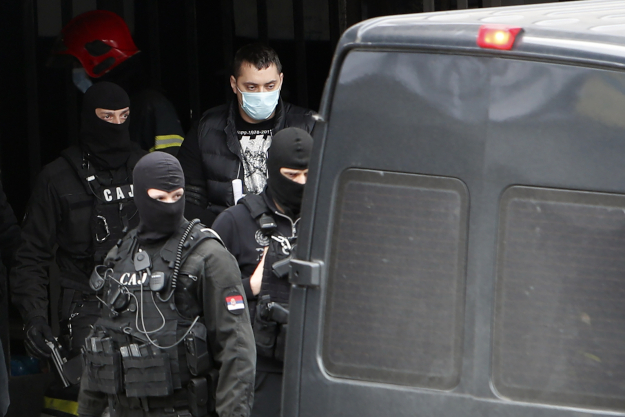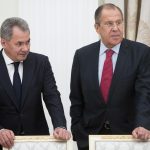Veljko Belivuk and his gang “Janjicari” (the gang took its name from the elite Ottoman infantry units under the Ottoman Empire) have long been the subject of investigations in Serbia.
Veljko Belivuk, known as ‘Velja Trouble’ and 16 other members of the group were arrested by Serbian police on February 4 this year on suspicion of murder, extortion, kidnapping, drug dealing, property destruction, and also the involvment of Belivuk in the murder of a fan of the Red Star club in 2015, and the murder of karateka Vlastimir Milosevic in 2017.
“The arrest of the Janjicari gang is part of the state’s fight against crime,” Serbian President Aleksandar Vucic declared on February 9, vowing to reveal any state officials who had helped the group.
Ana Brnabic, whom Vucic elected as his successor as prime minister in 2017, when he took over as president, described the arrests as “the biggest blow to organized crime since Operation Sablja”, following the assassination of Zoran Djindjic in 2003. In that case there were more than 11,000 people arrested.
But in July the case of Belivuk and his criminal organization would shake Serbia. Veljko Belivuk said that he was directly connected with the President of Serbia and, among other things, Aleksandar Vucic, asked him for various services.
Formed in 2013, the Janjicari emerged from the fan base of Belgrade’s Partizan football club. Partizan is state-owned and many government political officials are part of its executive board.
The tradition of using the muscles and criminal force of football ultras has been in the tradition of Serbian politics since the 1990s.
At the head of Janjicar was previously the 26-year-old Aleksander Stankovic, who was killed in Belgrade in 2016, under unexplained circumstances.
Belivuk and Stankovic were close to each other and Belivuk would take over the leadership of the group after his assassination.
The Investigative portal “KRIK”, which is also part of the Sarajevo-based Organized Crime and Corruption Reporting Project, reported that Belivuk initially, in the first months of his arrest, denied being a leader of Partizan ultras and responsibility for any of the crimes for which he was charged. He also refused to answer any questions.
But, later, Belivuk claimed that he was in contact with Vucic through one of the football team’s fans, Aleksandar Vidojevic, a friend of the president’s son, adding that he had personally contacted the president several times.
Members of Janjicar were seen to be present and on duty to maintain order during the inauguration ceremony, when Aleksander Vucic took over as president in 2017.
Also, Vucic’s 23-year-old son, Danilo, has been photographed several times with various members of Janjicar, including Aleksandar Vidojevic, arrested on February 4th during a police operation.
KRIK has also claimed that some of the transcripts they have provided confirm previous suspicions that Belivuk’s group played a key role in suppressing protests against Vucic and had relations with people in power.
KRIK wrote that Belivuk’s connections with influential politicians in Belgrade have enabled him to evade justice over the years.
Janjicari had a direct line of contact with the interior ministry through Dijana Hrkalovic, who until May 2019 was Secretary of State in the Interior Ministry.
Hrkalovic, a member of Vucic’s Progressive Party, has made a very quick career within the State security apparatus and has been the right-hand man of Interior Minister, Nebojsa Stefanovic, in 2014.
A year later Hrkalovic became secretary of the Criminal Police Department, and in 2017 state secretary of the Interior Ministry.
Hrkalovic was rumored to be close to Stankovic, Belivuk’s predecessor as Janjicari boss, and to be in a relationship with Nenad Vuckovic, a former member of the Serbian police gendarmerie unit.
Vuckovic was also the official representative of the Partizan fan group and a friend of Stankovic and Belivuk.
Hrkalovic, who is also thought to be linked to intelligence from other countries, and one of Vucic’s loyalists, left the Interior Ministry in May 2019, under unclear circumstances. She has changed her name two or three times and her whereabouts are not very clear.
What has this got to do with Serbian President Aleksandar Vucic?
The Belivuk case has shed light on several internal issues of the Serbian state. According to the investigation, Belivuk turns out to have connections with senior officials in Belgrade. Most likely directly with Vucic.
KRIK says that Belivuk said that he knew Vucic personally, that he had met him several times, and that he had been a member of the Progressive Party since 2011.
Belivuk says he had contacts with Vucic through Aleksandar Vidojevic, otherwise known as Aca Roshavi, a close friend of Vucic’s son.
During the Belivuk trial, he said that President Vucic and his entourage had asked for ‘many services’.
He said Vucic had committed to stopping fans from cheering him on, intimidating people into not protesting against the government and ensuring that the Belgrade Pride Parade went smoothly.
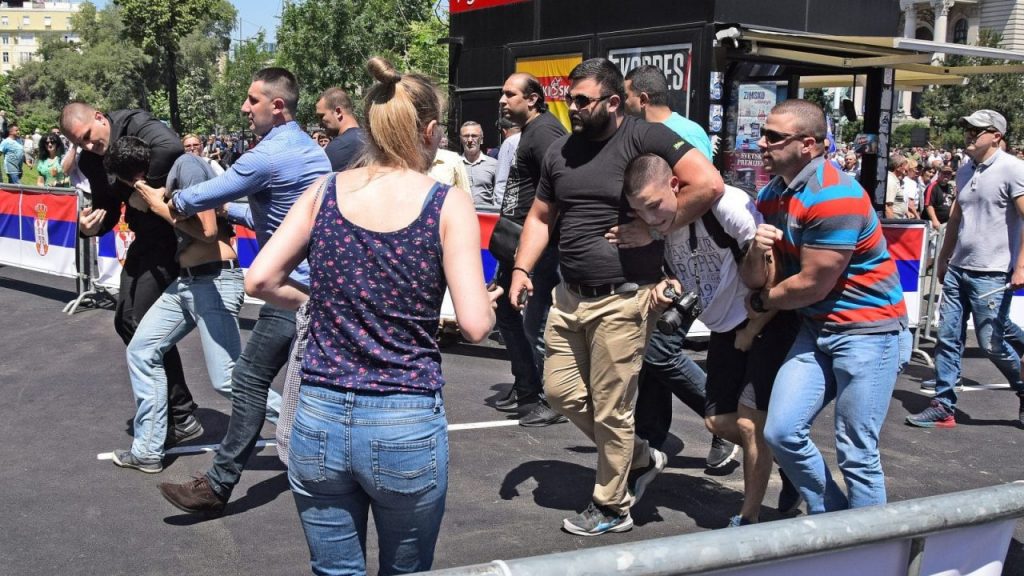
Vucic immediately denied this on Thursday, saying that “I have never seen or talked to that man.”
But here is what Belivuk told investigators, according to KRIK.
“I have decided to say everything politely about my relationship with the President of Serbia, Aleksandar Vucic, the Minister of Police, Aleksandar Vulin, the Vucic brothers, friends, and all the politicians who have asked us for services, and now they are behaving as if they do not they know each other, and wash their hands”.
Other allegations have been made by Belivuk, but there is currently no information on them.
Vuçiç’s reaction
Serbian President Aleksandar Vucic has denied having seen, met or ever talked to the criminal, Veljko Belivuk.
He stated that he was ready to speak publicly before the courts, or even publicly undergo polygraphy.
Vuçiç was justified by saying that “this story could not have been fabricated by the criminal group of Veljka Belivuk, but they received instructions from ‘mafia advisers'”.
He also warned that in the coming days he would provide more details about the connection between these criminals and ‘mafia advisers’.
Opposition reactions and what could be the possible scenario
The reactions of the Serbian opposition and the media have been mixed. Everyone agrees more or less. They are convinced that Belivuk will be convicted of his crimes, but are skeptical about the consequences for President Vucic.
Katerina Zivanovic, a Serbian “Danas” journalist, says “I am skeptical about what could happen. The court and the prosecutors and judges have been under Vucic for 10 years. During all this time, the prosecution has turned a blind eye to corruption”.
Vucic’s immediate offensive strategy is clear. Attack the best defensive tool. The media is attacked, Belivuk and his circle are attacked, and the people and media behind this “conspiracy” are also attacked.
Initially, Interior Minister Aleksandar Vulin, speaking to the Serbian media said that everything involving Belivuk’s criminal activity was true, except for the statement that he had collaborated with Vucic.
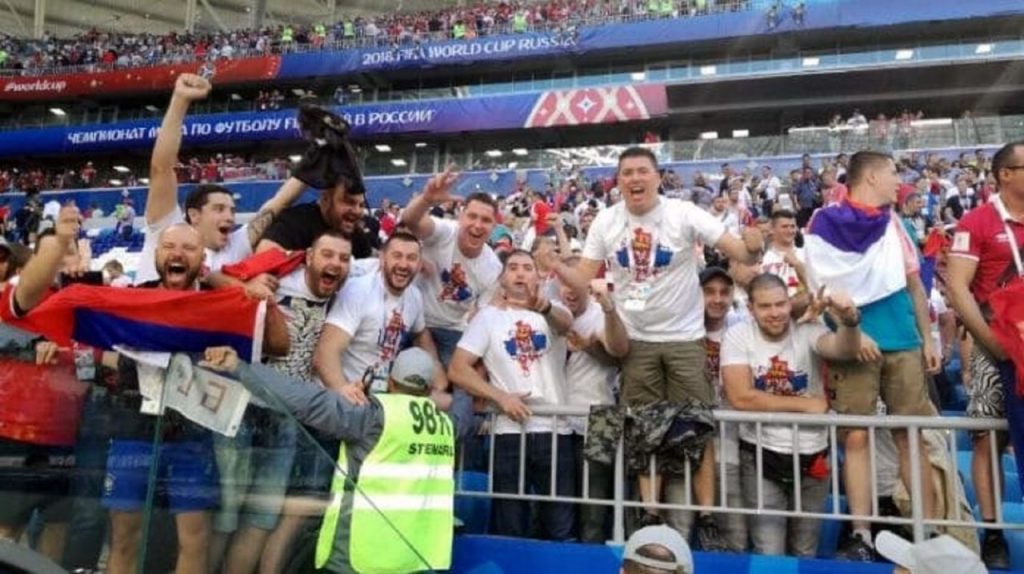
Vulin has tried to argue that Belivuk is trying to blackmail Vucic.
On the other hand, the Minister of Defense in Serbia, Nebojsa Stefanovic, through a public letter, said that there is not a bit of truth in the statement of Veljko Belivuk.
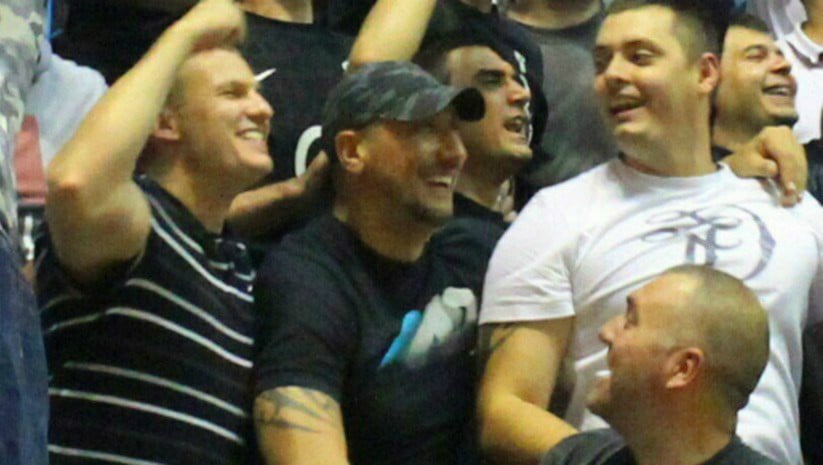
But here the issue becomes more interesting. This is exactly what could happen to the current Minister of Defense, Nebojsa Stefanovic, one of the dilemmas of the situation.
His Progressive Party colleagues and Vucic-controlled portals have started talking about him as if he were the one who worked with the Belivuk gang and not the President Vucic.
Vucic knows best that Stefanovic and Dijana Hrkalovic could have dangerous evidence in their hands.
According to the Serbian Research Center “Demostat”, Stefanovic was scheduled to leave the party after Vucic began clearing the party of certain figures.
Movements against Stefanovic have been seen since April this year. Serbian Defense Minister was questioned over the case against a former senior police official, Goran Papic.
The latter is suspected of having returned the seized car to a member of a criminal gang.
It is the first time in 20 years that a Serbian minister has been questioned as part of a criminal investigation while still in office.
Demostat says a “creepy dismantling of Stefanovic’s cadres in all party structures” is currently taking place.
However, analysts agree that it is very difficult to predict what will happen.
But what is certain from this event is the existence of links between organized crime and the State. The only question is whether we are dealing with sporadic connections or the existence of a State where its leaders act like the bosses of a mafia group?
Post Author
Author
-
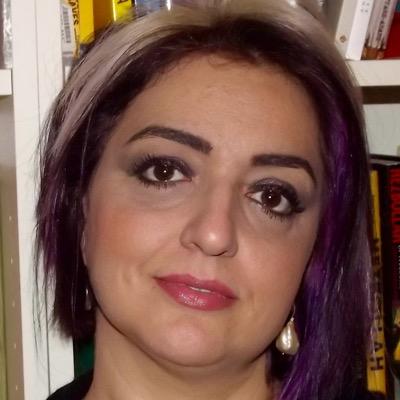
Researcher on International Relations Middle East and Balkans
View all posts
CSSII- Centro Interdipartimentale di Studi Strategici, Internazionali e Imprenditoriali,
Università di Firenze, Italy, Albania


